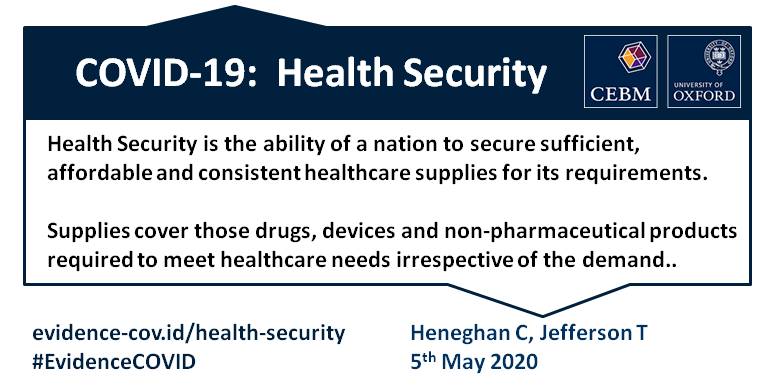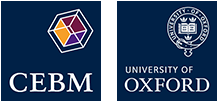COVID-19: Health Security
May 5, 2020

Carl Heneghan, Tom Jefferson
THE COVID-19 outbreak has revealed the need for the concept of ‘health security’ that ensures the health and wellbeing of societies irrespective of the demands.
Health Security is defined as: The ability of a nation to secure sufficient, affordable and consistent healthcare supplies for its requirements.
Supplies cover those drugs, devices and non-pharmaceutical products required to meet healthcare needs irrespective of the demand.
The need for secure drugs supplies
Interruption to the supply of medicines, and as a consequence the need to find alternatives is a common recurring problem. Part of the reason for this is that the supply of medicines is dominated by two countries: India and China supply nearly 80% of many commonly used generic drugs.
Interruptions to supply give rise to delays, cancellations, errors, significant cost escalations and in some cases deaths and ill-health. Given the scale of the problem the European Association of Hospital Pharmacists, has called on the EU Commission to “urgently commence an investigation of the medicines shortage problem.”
In the current COVID-19 outbreak there have been concerns over shortages of sedatives and painkillers for those most severely affected. In the EU there have been shortages of commonly used drugs in the intensive care unit setting that include certain anaesthetics, antibiotics and muscle relaxants that has necessitated the EU to agree new measures to support the availability of medicines in the COVID-19 pandemic.
COVID-19 has disrupted the usual supply chains. In February and March of this year, some Chinese factories were forced to cease production due to the outbreak. And on the 3rd of March, it was reported that India would provide its own people with essential medicines first, further exacerbating the shortages.
To ensure ‘Health Security,’ countries should be manufacturing more medicines within their borders. Reliance on imports has occurred because they are cheaper to manufacture overseas, but the secondary costs of sourcing supplies, the price hikes that go with shortages, the cost of stockpiling will likely outweigh the upfront costs. Health Security though ensures sustained timely access to the medicines needed to ensure health.
The closure of the MRC Common Cold Unit where the first coroniviridae were isolated and the David Bruce Laboratories where vaccines and sera were developed and produced in the UK are two examples of the loss of public security and autonomy that has characterised the last 40 years.
The need for secure medical device supplies
Many medical device companies have been working at full capacity to support the COVID-19 outbreak. The urgent needs include diagnostics, such as rapid PCR testing and serology testing; ventilators, software technologies and also diagnostic technologies such as thermometers and pulse oximeters.
The ability of a country to meet these needs can be dependent on their device infrastructure. The UK government’s chief medical officer has conceded that Germany “got ahead” in testing for Covid-19 and that the UK needed to learn from that. As one example, Bosch assigned its medical engineers to develop a diagnostic able to detect coronavirus in 2.5 hours. One of the reasons that Germany is largely ahead on diagnostics as its medical device market is the largest in Europe.
Countries are also trying to get digital tools off the ground to facilitate contact tracing and the use of Bluetooth device proximity to provide information on coronavirus exposure. The success of such interventions will rely on a consortium of medical device manufacturers, laboratories and data management systems.
The delivery of integrated device solutions is dependent on a device infrastructure that can meet a country’s needs while also being able to integrate and understand the data systems and the idiosyncrasies of each country’s health system. Health Security will not be feasible without a stable thriving internal device industry.
The need for secure non-pharmaceuticals
In an outbreak, non-pharmaceutical products include protective equipment: gloves, masks, face shields. It also includes the need to promote non-pharmaceutical interventions such as hand washing that requires large scale deployment of handwashing facilities. The need for non-pharmaceuticals is paramount to a flexible response to the unknown. Barriers, hygiene and societal interventions are the only protection that we have against all respiratory infectious agents, both the known and the unknown.
Health systems have often sourced the cheapest supplies (similar to drugs supply chains), which has exacerbated the widespread shortages. As many countries face the same shortages in a narrow window, the sourcing of PPE becomes harder. Leading to further shortages and cost escalations. Sourcing, however, is only one part of the PPE supply chain problems. Delivering sustainable ongoing supplies becomes a logistical problem due to the complex varied healthcare settings that require supplies.
The global shortages of personal protective equipment have shown up the urgent need to have secure supply chains for non-pharmaceuticals that are nearer to the need.
The need for a global response
The most developed countries will find it easier to create a ‘health security’ environment because of their pre-existing infrastructure. Those countries that are able to meet the requirements of health security by further developing their own infrastructure could partner with less developed countries to aid their in-house development of secure supply chains.
However, the bitter experience of Italy, a founding member of the EU, left to fend for itself in the early part of the pandemic shows that solidarity is still in as short a supply as PPE.
A particular focus for health security could be the essential medicines, devices and non-pharmaceuticals that are central to the goal of achieving Universal Health Coverage.
Authors
Carl Heneghan is Professor of Evidence-Based Medicine, Director of the Centre for Evidence-Based Medicine and Director of Studies for the Evidence-Based Health Care Programme. (Full bio and disclosure statement here)
Tom Jefferson is an Epidemiologist. Disclosure statement is here

